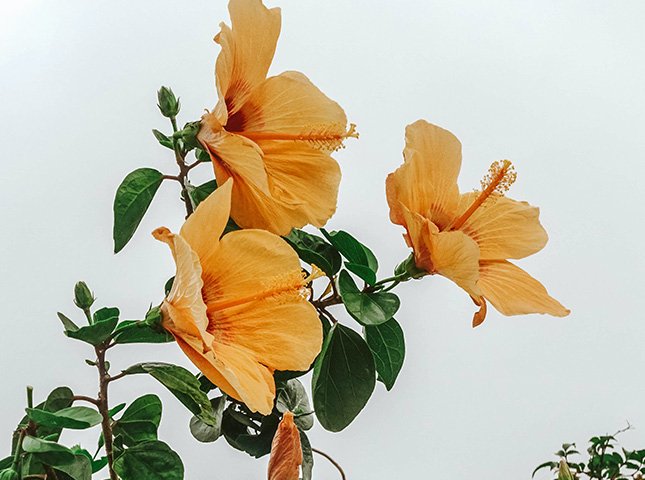Deer and hibiscus – two diverse elements of nature. Do they intertwine in a fascinating tale? Curiosity beckons!
We discover deer have varied dietary preferences. Grass and leaves are their staples, but their appetite extends beyond. Depending on location and other food sources, hibiscus may be on the menu.
Different species of hibiscus possess varying appeal. Taste and nutritional value play a role. Deer may resort to hibiscus when other food options are scarce.
History reveals intriguing anecdotes. Native American tribes revered hibiscus plants and flowers. The deer’s role adds depth to the narrative tapestry, weaving nature’s wonders with human culture.
Table of Contents
Understanding deer eating habits
Deer have diverse eating habits, depending on region and food sources. Let’s explore 3 key points.
- Deer are herbivores, meaning they eat mainly plant material. This includes leaves, shoots, stems, fruits, and bark. In warmer months, they eat grasses and shrubs. In colder climates, they eat buds and twigs from trees like maple and oak.
- Deer have preferences for certain types of vegetation. They like tender new growth in spring. They also avoid plants with toxins or unpalatable flavors.
- But deer can accidentally ingest poisonous substances. Homeowners and gardeners must be aware of these plants in their area.
To protect hibiscus plants from deer, install a physical barrier like a fence at least 8 feet tall. Also, use repellents with putrescent egg solids or predator urine scents.
Do deer eat hibiscus?
Deer are drawn to hibiscus due to its attractive scent and taste. Especially in summer when food sources are scarce. Its bright colors also catch their attention. They usually head to gardens near open pathways or forests. Drought and extreme weather can drive them towards residential areas with gardens, including those with hibiscus.
Gardeners need strategies to keep deer away. Odor repellents, fencing and planting deer-resistant alternatives are some ways. But, no method is foolproof, so a combination of approaches may be necessary.
Pro Tip: Inspect hibiscus plants for signs of feeding and damage. This will help gardeners take swift action to protect the plants.
Preventing deer from eating hibiscus
To prevent deer from eating your hibiscus, use deer repellents, employ physical barriers, and plant deer-resistant plants nearby. Installing deer repellents, using physical barriers, and planting deer-resistant plants near hibiscus are key solutions to protect your plants from deer damage.
Installing deer repellents
- Plant herbs like lavender or mint near your hibiscus. These strong scents can keep deer away.
- Install motion-activated sprinklers in your garden. When a deer comes close, the sprinklers will activate and scare it off.
- Hang aluminum foil or CDs around your hibiscus. The flashing light and movement can startle deer and make them go away.
- Use commercial repellents with ingredients like garlic or hot pepper. These scents are unappetizing for deer and will make them stay away.
To make these methods more effective, switch and combine them often. This way the deer won’t get used to one deterrent. Did you know that ancient Roman gardeners used lion dung as a natural deer repellent? They thought the lions’ scent would frighten the gentle herbivores. Though using lion dung isn’t practical today, it shows how gardeners throughout history have found ways to protect their plants from animals.
Using physical barriers
- Fencing: Put a high and sturdy fence around your hibiscus plants to keep out the deer.
- Netting: Place netting around the plants to form a shield. This will stop deer from getting close to the flowers.
- Trellises: Build trellises near your hibiscus plants. This will create a natural wall that will make the deer stay away.
- Repellent sprays: Spray the plants and the area around them with repellent. This will help keep the deer away.
- Motion-activated sprinklers: Set up sprinklers that will startle deer when they approach the hibiscus plants.
- Deterrent devices: Put noise-making devices or reflective objects around the plants, to frighten the deer.
It’s important to remember that different areas may need particular methods. Consult local gardening experts to get advice that suits your region. The University of Kentucky Cooperative Extension says that installing a fence is the most reliable way to protect hibiscus from deer damage.
Planting deer-resistant plants near hibiscus
Protect your hibiscus from deer with these strategies:
- Plant lavender, rosemary, yarrow, and other plants with strong scents or textures.
- Plant taller shrubs or small trees as a visual barrier.
- Diversify your garden to decrease likelihood of deer developing a taste for certain plants.
Plus, keep in mind:
- No plant is truly deer-proof. Monitor protective measures regularly.
- Incorporate thorny or prickly plants as deterrents.
- Use motion-activated sprinklers or lights.
- And apply repellents such as garlic, pepper, or rotten eggs.
Do all this and you’ll safeguard your hibiscus while adding beauty to your garden.
Conclusion
So, do deer eat hibiscus? Let’s review:
- Deer like to munch on many plants, including hibiscus.
- Their leaves and flowers are tempting treats.
- Fences and repellents can help protect hibiscus from hungry deer.
- In areas with a lot of deer, it’s important to take steps to guard your hibiscus.
Also, some gardeners have had success with natural deterrents like smelly sprays and noise-makers. But, others haven’t. So, it might take some trial-and-error to find what works best to keep deer away from your hibiscus.
Frequently Asked Questions
1. Can deer eat hibiscus plants?
Yes, deer can eat hibiscus plants. They are known to have a taste for certain types of hibiscus, especially when other food sources are scarce.
2. Are all hibiscus varieties equally attractive to deer?
No, not all hibiscus varieties are equally attractive to deer. Some varieties may be more resistant to deer browsing due to their taste or scent, while others may be more vulnerable.
3. How can I protect my hibiscus plants from deer?
To protect your hibiscus plants from deer, you can use physical deterrents such as fences or netting. Additionally, applying deer repellents or using plants that are less attractive to deer can also help deter them.
4. Are there any hibiscus varieties that deer tend to avoid?
While it is difficult to guarantee deer avoidance, some hibiscus varieties, such as the rose of Sharon (Hibiscus syriacus), are known to be less preferred by deer. Consider planting these varieties if you are concerned about deer damage.
5. Are there any natural deer repellents I can use on my hibiscus plants?
Yes, there are natural deer repellents available in the market. Some commonly used natural repellents include sprays made from garlic, hot peppers, or predator urine. However, their effectiveness may vary.
6. Will deer always eat my hibiscus plants?
While deer are known to consume hibiscus plants, their feeding behavior can be influenced by various factors such as local deer population, availability of other food sources, and the level of hunger. Providing alternative food sources and using deterrents can help reduce the likelihood of deer eating your hibiscus plants.


